18 million viewers tuned in for the Republican debate
By the numbers
Welcome to Trail Guide, your host through the wilds of the 2016 presidential campaign. It's Wednesday, Dec. 16, and here's what we're talking about:
- The debate was the third-most-watched of the election - and of all time
- Donald Trump pledged his support to the GOP last night, as he has before. Will it stick ?
- Ted Cruz and Marco Rubio acted like the front-runners, and political correctness was the enemy. Find all of our takeaways from the debate here
- The fallout from terrorist attacks dominated the night
- Rivals aren't willing to risk the wrath of Trump's supporters by going after him, Cathleen Decker writes
Riordan, a Rubio and Bush donor, escorts Ted Cruz to Beverly Hills fundraiser
As a wealthy former Republican mayor of Los Angeles, Richard Riordan has little trouble getting face time with the party’s presidential candidates. On Wednesday, it was Ted Cruz’s turn.
Riordan, who has given money to GOP presidential hopefuls Marco Rubio and Jeb Bush, greeted Cruz at a private air terminal on West Imperial Highway, then rode with him to a Beverly Hills fundraiser for the Texas senator.
“Cruz is certainly sailing much higher than Bush is now,” Riordan said as he awaited Cruz’s arrival.
Riordan hasn’t made up his mind on whom to back for president, but said that making Donald Trump the Republican nominee “would be the greatest joke ever pulled on the people of the United States.”
“I must admit I like a lot of what he says, but he just is not somebody I want to see as president,” Riordan said.
The former mayor has a history of donating to both Republicans and Democrats, including President Obama. He likes two other Republicans running for president: New Jersey Gov. Chris Christie and Ohio Gov. John Kasich.
As The Times has reported, Riordan was listed on an invitation to a Bush fundraiser in Brentwood on Wednesday as a member of the former Florida governor’s Southern California Finance Committee.
“I didn’t agree to be on any committee, but that’s ok,” he said. “I’m not angry about it. That’s just the way politics is.” Bush’s fundraiser was at the home of Brad Freeman, a former partner of Riordan’s at a leveraged buyout firm. A Bush spokeswoman said Riordan “gave us confirmation to be on the invite.”
About a month ago, Bush visited Riordan’s home in Brentwood. “I had like 15 of the wealthier people in L.A., we had them around a big table and questioned him, and I like him a lot,” Riordan said. “I think he just has to catch on.”
Ted Cruz denies disclosing classified surveillance secrets at GOP debate
Texas Sen. Ted Cruz denied that he released classified information in Tuesday’s Republican presidential debate, saying he’d revealed no secrets during a spat with Florida Sen. Marco Rubio over national security.
Speaking to reporters Wednesday at a private air terminal in Los Angeles at the start of a California fundraising trip, Cruz said the information he’d shared on U.S. surveillance techniques “had been widely reported.”
“It’s been saturated in the public sphere,” Cruz said.
The Associated Press quoted Senate Intelligence Committee Chairman Richard M. Burr (R-N.C.) as saying he’d asked his staff to review whether Cruz released classified information at the debate. Later, Burr issued a joint statement with Sen. Dianne Feinstein (D-Calif.), the committee vice chair, saying the panel “is not investigating anything said during last night’s Republican Presidential debate.”
At the Las Vegas debate, which focused largely on which of nine candidates would keep America safe from terrorism, Cruz made his remarks about the surveillance after Rubio attacked him for voting to end a National Security Agency program that collected bulk data on the telephone calling patterns of all Americans.
Cruz argued that the bill strengthened the tools of intelligence and law-enforcement agencies to investigate terrorism by allowing the targeting of cellphones and “Internet phones.” He said “the old program covered 20% to 30% of phone numbers to search for terrorists; the new program covers nearly 100%.”
Rubio then stopped just short of accusing Cruz of exposing national secrets. “Let me be very careful when answering this, because I don't think national television in front of 15 million people is the place to discuss classified information,” he said.
The sparring comes as Rubio and Cruz are both vying to emerge as the party’s leading alternative to Donald Trump, the front-runner for the Republican presidential nomination.
Cruz also attacked Rubio on immigration Wednesday. Cruz told reporters at the West Imperial Highway air terminal that Rubio had conceded in the debate that he supports “granting citizenship to 12 million people here illegally.”
“That’s an important moment of candor,” he said before leaving for fundraising events in Beverly Hills and Orange County.
Rubio campaign spokesman Jahan Wilcox said Cruz had also backed legalization of millions of immigrants who entered the country illegally, was “launching false attacks” and had sided with President Obama in weakening the nation’s intelligence gathering.
“The last thing we need is four more years of Barack Obama’s national security strategy in the White House,” Wilcox said.
No, Ted Cruz is not being investigated for leaking classified details
Republican debate averaged 18 million viewers
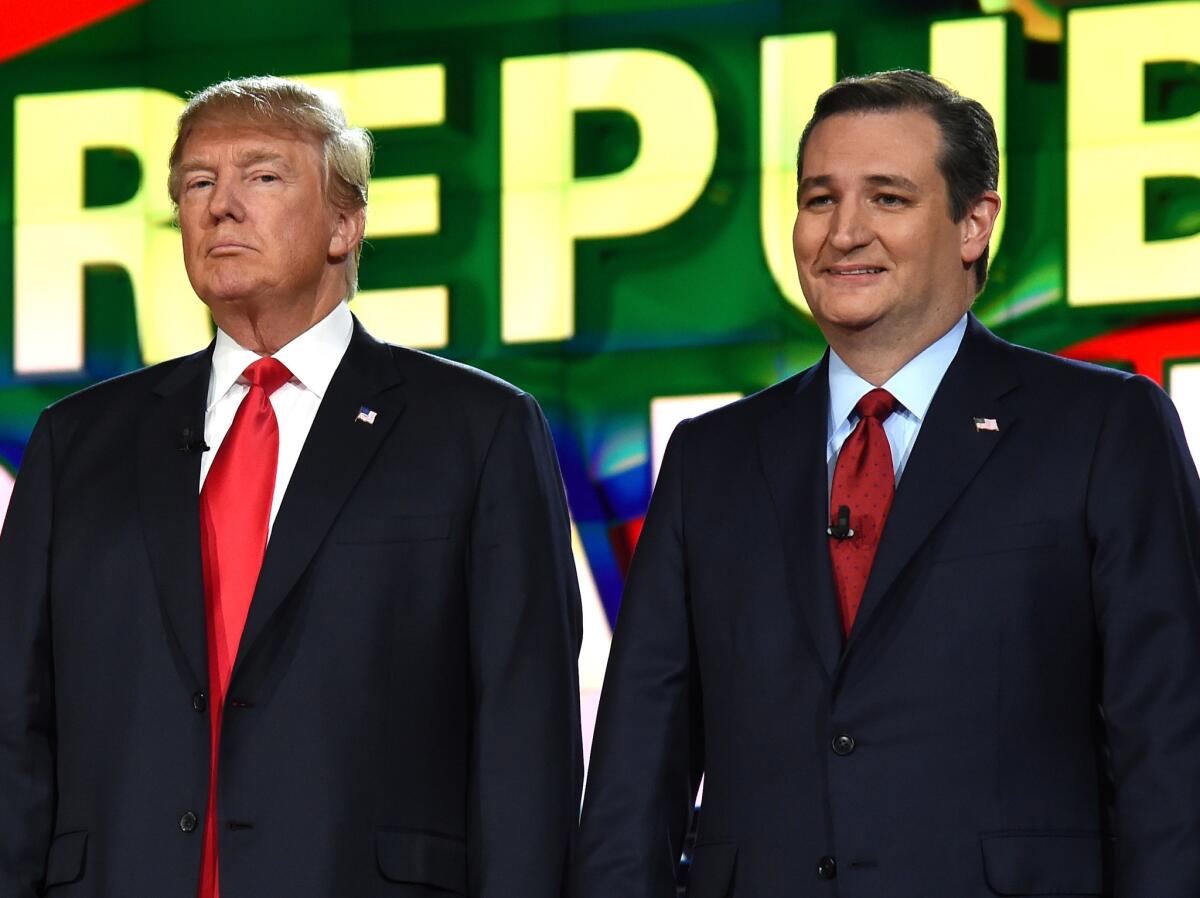
Donald Trump, left, and Sen. Ted Cruz of Texas on stage during the GOP presidential debate in Las Vegas on Tuesday night.
Donald Trump and the other candidates for the 2016 Republican presidential nomination are still the hottest stars of prime time.
The fifth GOP debate averaged 18 million viewers on CNN on Tuesday, continuing the run of monster ratings for the events that in past years were watched mostly by political junkies at this point of the campaign cycle. Before this year, the previous high for a Republican primary debate was ABC's telecast on Dec. 10, 2011, scoring 7.6 million viewers, according to Nielsen.
McNamara: We need an elimination round already
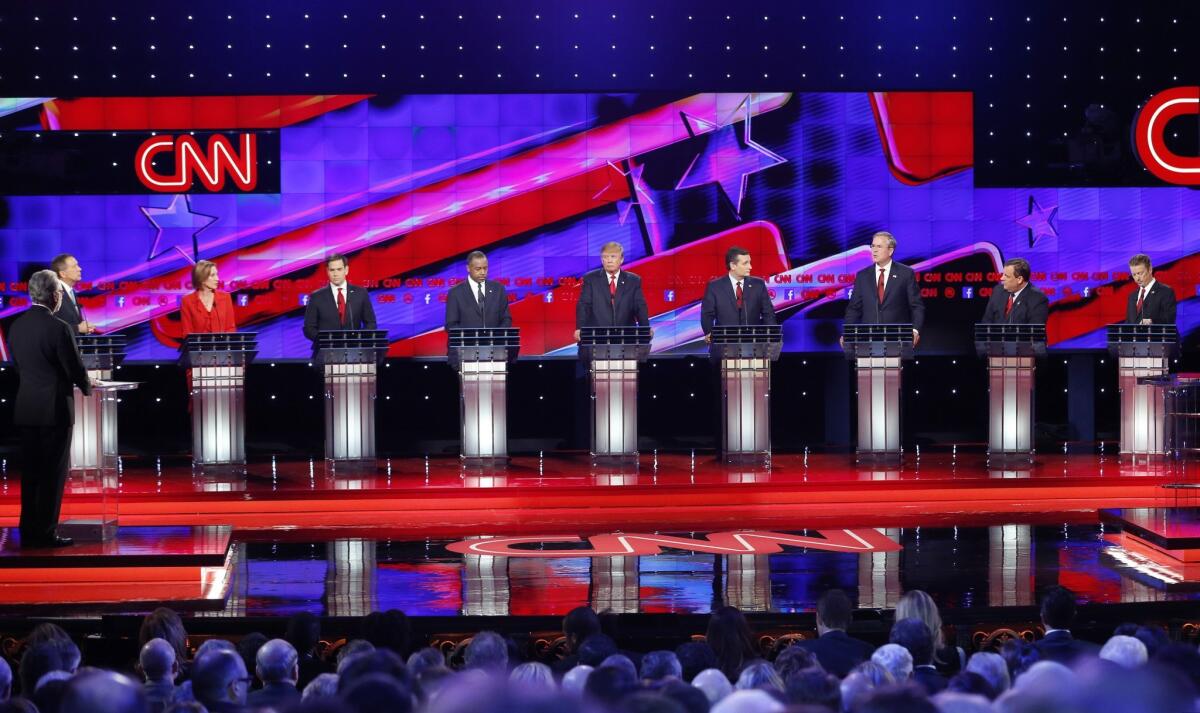
Republican presidential candidates, from left, John Kasich, Carly Fiorina, Marco Rubio, Ben Carson, Donald Trump, Ted Cruz, Jeb Bush, Chris Christie, and Rand Paul respond to debate moderator Wolf Blitzer, far left, during the Republican presidential debate at the Venetian Hotel & Casino in Las Vegas.
Wolf Blitzer and CNN made at least one thing very clear in Las Vegas on Tuesday night: The biggest problem with this year’s Republican debates was not manipulative moderators or “cage match” formats or even the rabid boorishness of Donald Trump.
The biggest problem with the Republican debates was the ridiculous number of candidates.
While one certainly does not want to compare presidential politics to reality television, there is something to be said for a progressive number of elimination rounds. The fact that 13 people are still running for the Republican nomination is no longer exciting, amusing or symbolic: It’s a logistical and narrative nightmare, at least when it comes to a national debate.
Trump's commitment to Republicans sounds familiar
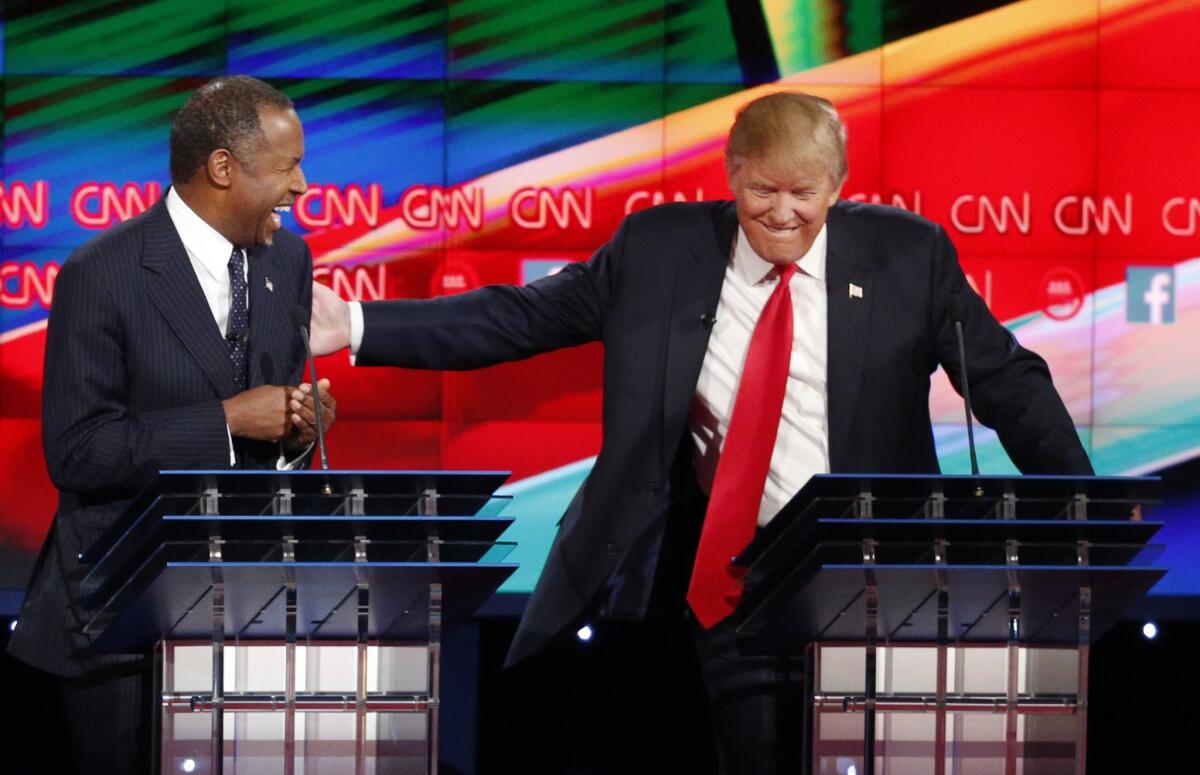
Ben Carson, left, and Donald Trump laugh during the Republican presidential debate at the Venetian Hotel & Casino in Las Vegas.
Grasping for reassurance, Republican Party leaders were pleased when Donald Trump vowed in Tuesday night’s debate to stick with the GOP should he lose the party’s nomination.
Asked whether he was prepared to “abide by the decision” of voters and forswear a third-party bid, Trump quickly responded, “I really am. I’ll be honest … I am totally committed to the Republican Party. I feel very honored to be the front-runner. ... I will do everything in my power to beat Hillary Clinton.”
If the reassurance sounds familiar, it’s because the bumptious billionaire previously made a similar promise.
In September, Trump signed a GOP “loyalty pledge,” vowing to support the party’s eventual nominee and ruling out a third-party candidacy that almost assuredly would hand the White House to the Democrats by siphoning off conservative and independent votes.
Trump since has dropped hints of going rogue, most notably last week as prominent Republicans criticized his call for a ban on Muslim immigration to the United States. On Twitter, Trump blasted out results of a poll showing that two-thirds of his supporters would back him if he abandoned the GOP and ran for president as an independent.
This time, he insisted in a CNN interview, he really means what he says.
“I’m going to be a Republican. I’m not going to be doing a third-party,” Trump said. “No matter what.”
But if anyone doubts that Trump is done flirting with an independent bid, and all the attention it would bring, there is a New York skyscraper he’d like to sell …
What Trump said: fact or fiction?
Here's how Donald Trump's Republican debate remarks matched up to reality.
Fellow senator looking into whether Ted Cruz leaked classified information in debate
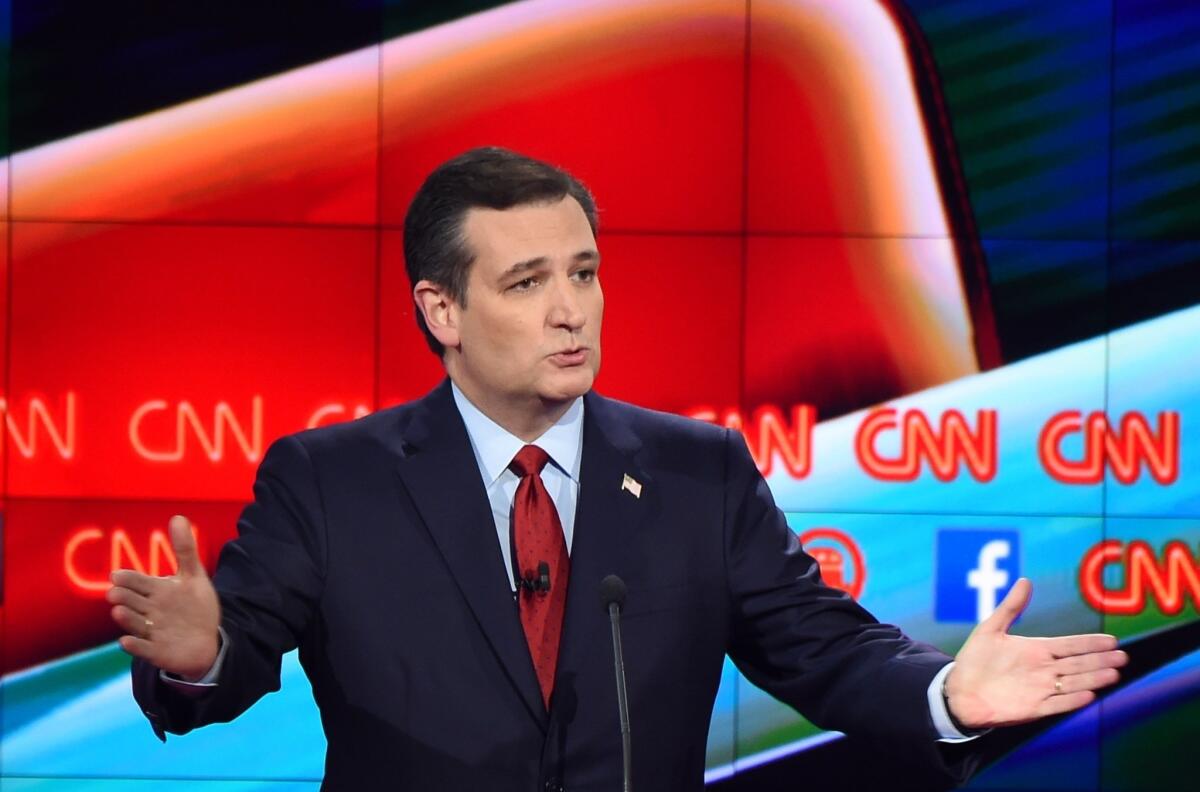
Republican presidential candidate Texas Sen. Ted Cruz emphasizes a point made during the CNN debate in Las Vegas on Tuesday.
The chairman of the Senate Intelligence Committee said Wednesday he has asked his staff to look into whether Texas Sen. Ted Cruz released classified information during Tuesday night's GOP presidential debate.
Cruz made a claim during an exchange with Florida Sen. Marco Rubio about the new USA Freedom Act, which Cruz supported and Rubio opposed. Cruz said that "nearly 100%" of phone numbers can be checked for terrorist ties under the new program, compared with "20% to 30%" under earlier Patriot Act provisions.
Rubio responded that national television was not the place to discuss classified information, before going on to dispute Cruz's suggestions.
The chairman, Sen. Richard M. Burr (R-N.C.) said that any time specific numbers are discussed, a question emerges as to whether the information is classified or open source.
"The question had been raised. Therefore I asked them to look at it and see if there was any validity to it," Burr told reporters.
Analysis: Trump's hold on his supporters has rivals backing off
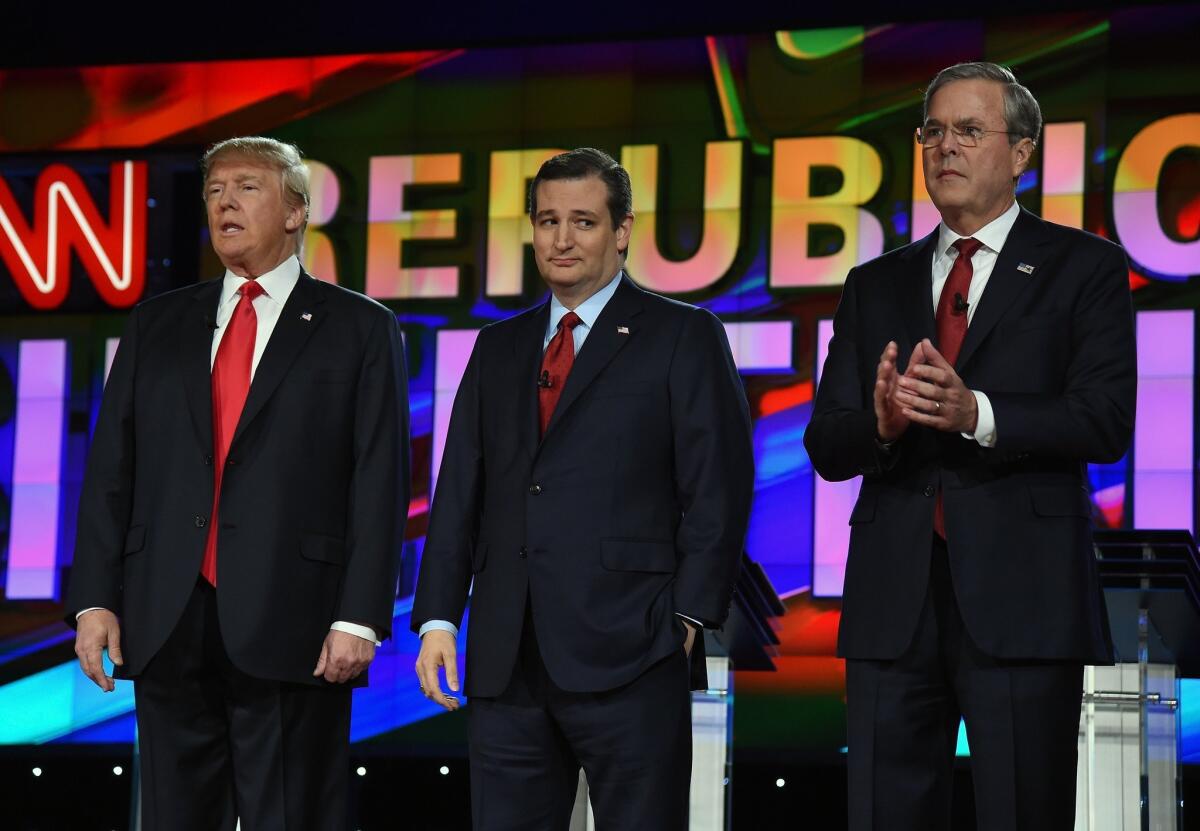
Republican presidential candidates Donald Trump, from left, Texas Sen. Ted Cruz and Jeb Bush stand on stage during the CNN debate in Las Vegas on Tuesday.
Were Donald Trump a typical presidential candidate, he might have suffered from his inability in Tuesday’s debate to respond to a question about the "nuclear triad." Presidents are, after all, expected to know what would happen if they ordered the nation’s most powerful weapons launched.
At the very least, when Marco Rubio explained the term -- the U.S. can deliver nuclear warheads by plane, submarine or ground-based missiles -- the Florida senator might have been more barbed with a different candidate.
"Maybe a lot of people haven’t heard that terminology before," Rubio said, instead, without a hint of a smirk.
But as the 2016 presidential contest has amply demonstrated, Trump became and has stayed the national front-runner not on his policy chops but on his gut-level connection with the party’s most aggrieved voters.
And as the debate showed, the hold that Trump has on a plurality of the Republican electorate continues to inspire fear in his closest competitors.
Another debate, another big audience
One issue the Republican candidates agree on: No Syrian refugees
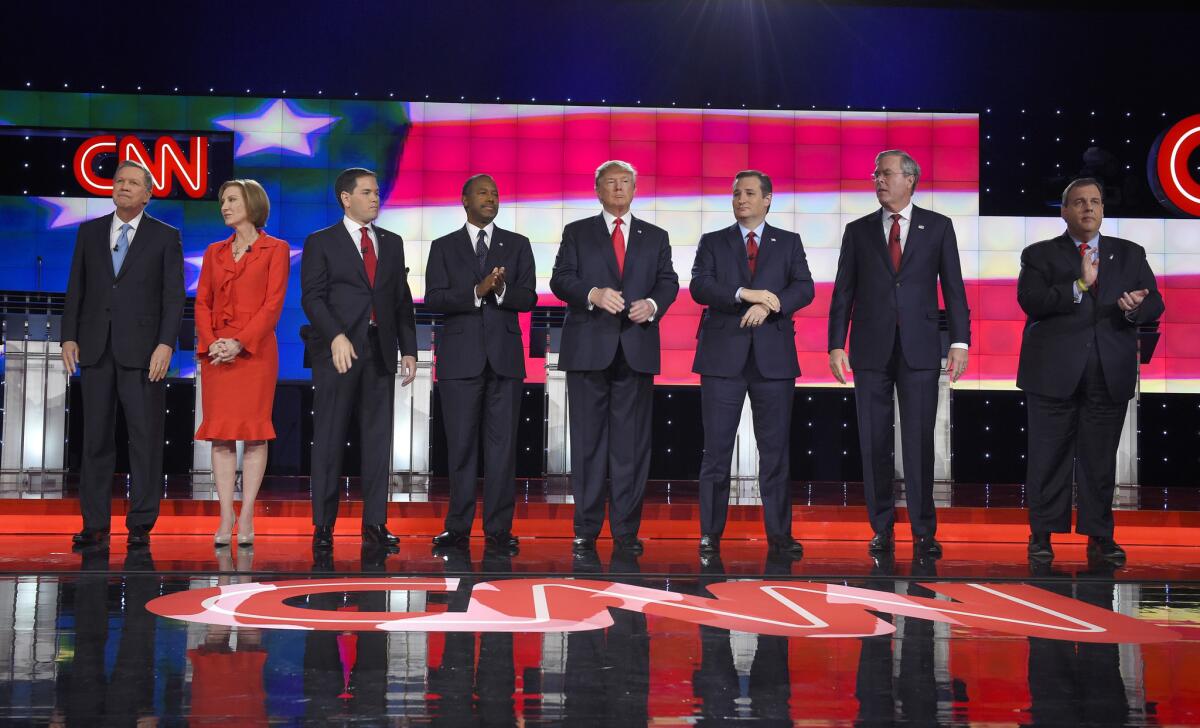
Republican presidential candidates, from left, John Kasich, Carly Fiorina, Marco Rubio, Ben Carson, Donald Trump, Ted Cruz, Jeb Bush, Chris Christie, and Rand Paul take the stage during the Republican presidential debate at the Venetian Hotel & Casino in Las Vegas.
The GOP presidential candidates sparred Tuesday night over their leadership skills and the United States’ role in the Middle East. But they found common ground on President Obama’s plan to allow 10,000 refugees next year – all of the candidates opposed the move, arguing that the inability to thoroughly vet them would allow terrorists to infiltrate the country.
The subject came up several times throughout the night, notably when a student named Carla Hernandez from the University of Texas at Austin asked the question via a video on Facebook. Here's what she asked.
“If the Bible clearly states that we need to embrace those in need and not fear, how can we justify not accepting refugees?”
The candidates had plenty to say.
Terrorism and tough talk dominate at debate
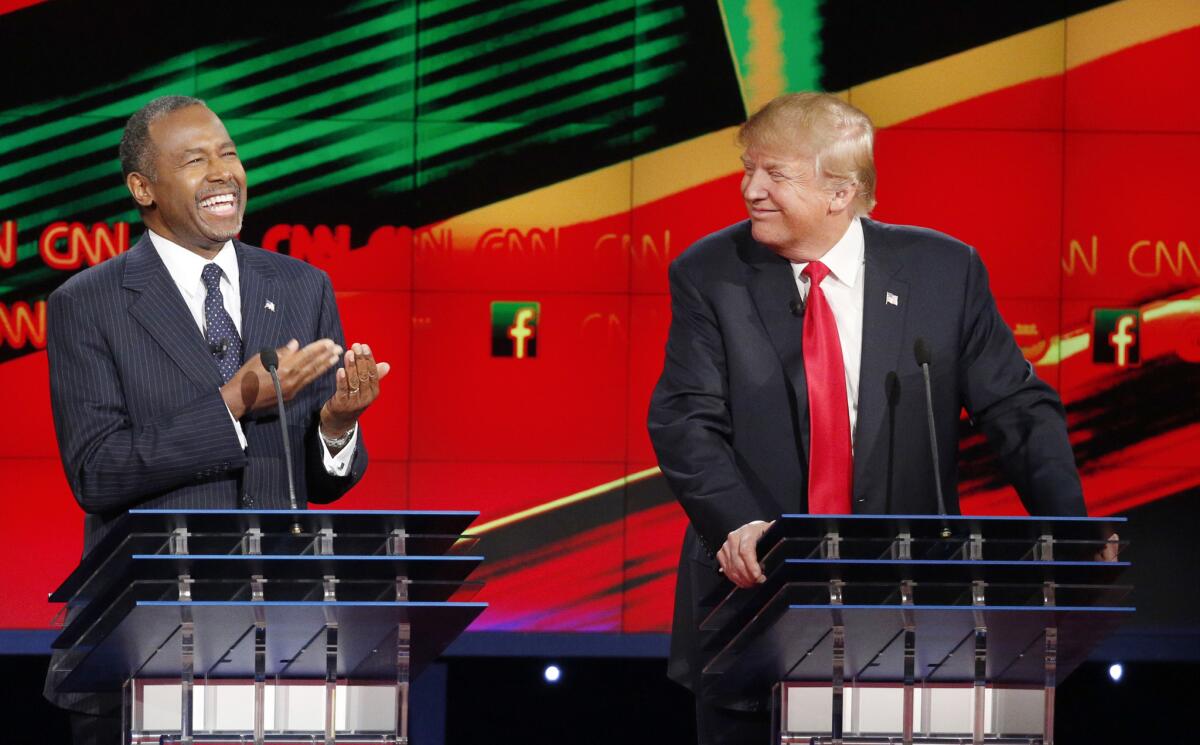
Ben Carson, left, and Donald Trump at the Republican presidential debate at the Venetian in Las Vegas.
Republican presidential hopefuls fought to out-tough one another Tuesday night in a raucous debate animated by fears of terrorism and disagreement over how best to prevent attacks like the massacres in Paris and San Bernardino.
Agreeing on the need to destroy the Islamic State terrorist group and eager to blame President Obama and former Secretary of State Hillary Clinton for its ascendance, the candidates quickly squared off in a series of heated exchanges over the line between protecting Americans and trampling their rights.
Donald Trump was at the center of the back-and-forth for much of the evening, provoking rivals as he has throughout the presidential campaign.
Priebus: Brokered GOP convention possible, not probable
Is a brokered convention a possibility for the GOP? Watch what RNC chair @Reince told @SavannahGuthrie https://t.co/im2n41r9ml
— TODAY (@TODAYshow) December 16, 2015
Republicans shouldn’t worry about their 2016 presidential candidates: Republican National Committee chairman Reince Priebus said he is confident a single candidate will rise to the nomination for president come spring. In an interview with NBC on Wednesday, Priebus acknowledged the possibility of a brokered convention, but said he doesn’t believe the party will reach that point.
“We will have a presumptive nominee by the middle of March or April,” Priebus told “Today Show” host Savannah Guthrie. “The odds of a contested convention are almost nothing.”
Guthrie questioned Priebus’ support of businessman Donald Trump and asked if the party would support him if he appeared to clinch the nomination. She noted that several Republican politicians struggle to or outright refuse to say they would support Trump as the nominee. Some have warned that a Trump nomination would all but assure a White House win for Democratic front-runner Hillary Clinton.
Priebus still reiterated his support for whichever candidate makes it, including Trump.
“The RNC is built for whoever the nominee is,” he said. “It doesn’t matter if it’s [Trump] or someone else. We’re going to support whoever the nominee is.”
He also responded to Trump’s declaration Tuesday that he won’t consider an independent bid, but will honor his Republican Party pledge.
Before Tuesday’s fifth GOP debate in Las Vegas, Priebus addressed the audience and spoke on the RNC’s mission to correct the mistakes that cost it the last two presidential elections.
“The one thing that we all need,” he continued, “and the one thing that every one of the candidates need on this stage is a competent national party. And it’s something that we’re all striving to do and working for every day.”
Trump plays coy with GOP
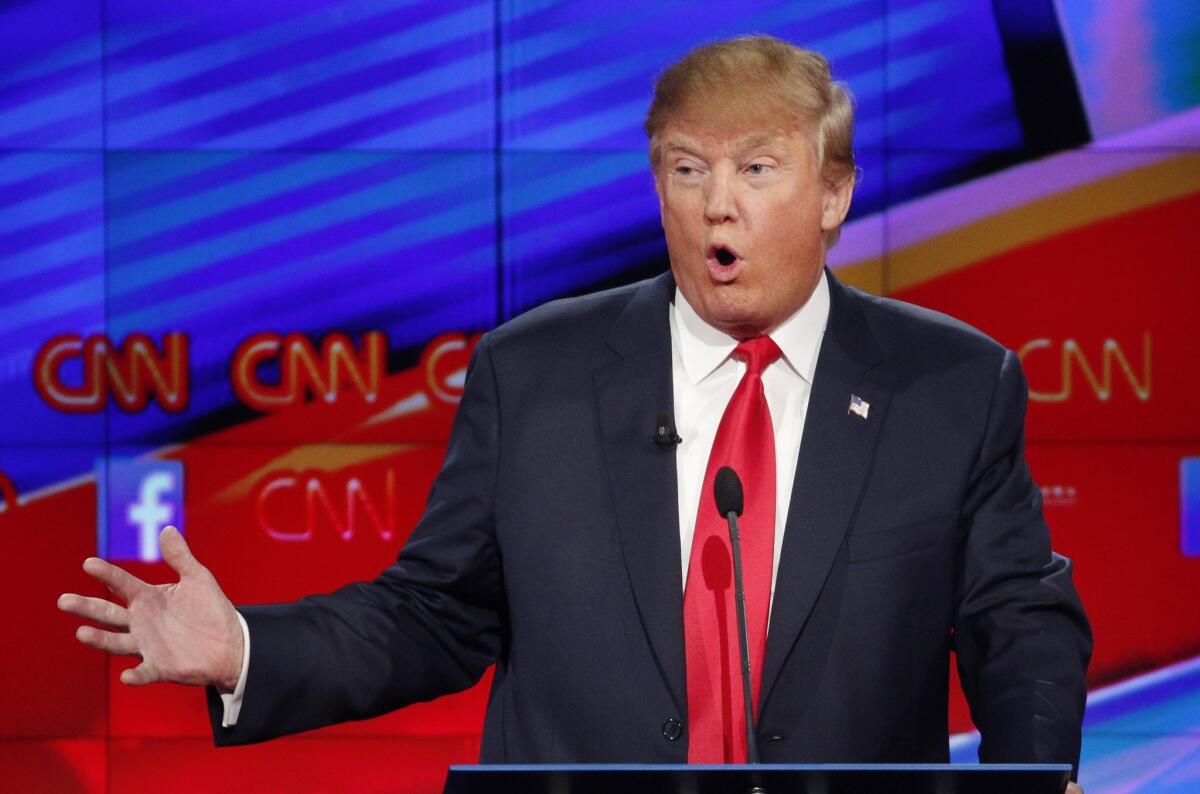
Donald Trump makes a point during the CNN Republican presidential debate at the Venetian Hotel & Casino in Las Vegas.
GOP party leaders can perhaps take a breath — businessman Donald Trump declared he will not abandon his pledge of loyalty to the party should he not secure its nomination for president. That’s what he told CNN after Tuesday’s fifth GOP debate in Las Vegas, but whether he stays true to his word remains a mystery.
"I'm going to be a Republican, I'm not going to be doing a third-party" run, Trump told CNN host Chris Cuomo. "No matter what."
Last week, Trump hinted at the idea of launching an independent bid. He said the pledge he signed in September stipulated that the Republican Party must treat him fairly. His proposal to ban travel to the United States by Muslims drew heavy criticism from politicians representing both major parties.
Though he remains a front-runner in the race, he lost some of his usual flair on stage Tuesday.
Trump stumbled during the debate and former Florida Gov. Jeb Bush took advantage. The businessman defended his campaign by citing poll numbers and lodging attacks at both rivals and moderators. But to no avail, as audience members took to booing him.
Still, he said he remains confident in the respect he maintains he gained in the last few weeks from the Republican leadership. That view appears to be key to him skipping an independent campaign.
By the numbers
Get the L.A. Times Politics newsletter
Deeply reported insights into legislation, politics and policy from Sacramento, Washington and beyond. In your inbox three times per week.
You may occasionally receive promotional content from the Los Angeles Times.



